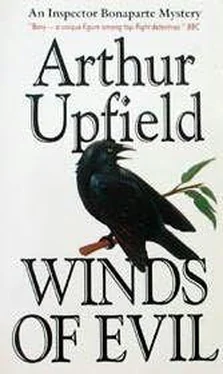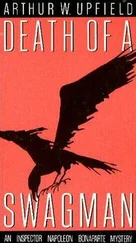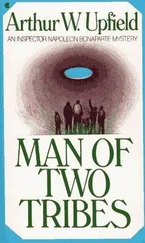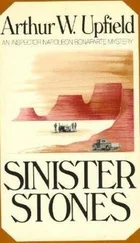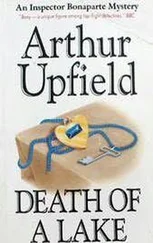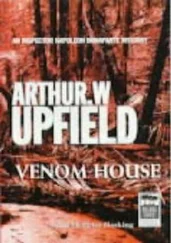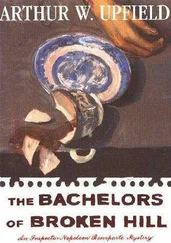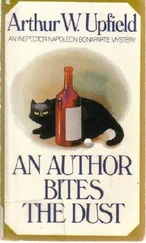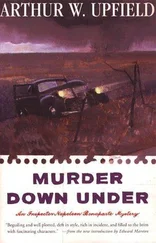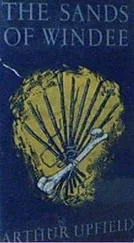Arthur Upfield - Winds of Evil
Здесь есть возможность читать онлайн «Arthur Upfield - Winds of Evil» весь текст электронной книги совершенно бесплатно (целиком полную версию без сокращений). В некоторых случаях можно слушать аудио, скачать через торрент в формате fb2 и присутствует краткое содержание. Жанр: Классический детектив, на английском языке. Описание произведения, (предисловие) а так же отзывы посетителей доступны на портале библиотеки ЛибКат.
- Название:Winds of Evil
- Автор:
- Жанр:
- Год:неизвестен
- ISBN:нет данных
- Рейтинг книги:4 / 5. Голосов: 1
-
Избранное:Добавить в избранное
- Отзывы:
-
Ваша оценка:
- 80
- 1
- 2
- 3
- 4
- 5
Winds of Evil: краткое содержание, описание и аннотация
Предлагаем к чтению аннотацию, описание, краткое содержание или предисловие (зависит от того, что написал сам автор книги «Winds of Evil»). Если вы не нашли необходимую информацию о книге — напишите в комментариях, мы постараемся отыскать её.
Winds of Evil — читать онлайн бесплатно полную книгу (весь текст) целиком
Ниже представлен текст книги, разбитый по страницам. Система сохранения места последней прочитанной страницы, позволяет с удобством читать онлайн бесплатно книгу «Winds of Evil», без необходимости каждый раз заново искать на чём Вы остановились. Поставьте закладку, и сможете в любой момент перейти на страницу, на которой закончили чтение.
Интервал:
Закладка:
No longer could she see the division of land and sky. Far distant a bright light burned steadily as though through the uncurtained window of a stockman’s hut. Not being interested in the stars, Mrs. Nelson could not name this one. Nogga Creek was now a dark fold in a deep cloth of velvet.
The minutes passed unnoticed by the watching woman. Sounds of town life slowly became hushed as the plain nestled beneath the blanket of night. One by one the sitters rose and passed beyond doors. Lights within the houses winked out to stare at Mrs. Nelson and from below came the familiar sounds made by the hotel yardman when placing steps in position and mounting them to light the lamp suspended over the main door. By now the Common gates had been eaten up by the night and the plain was sinking swiftly into a pit.
Came presently a swish of starched clothes. Tilly appeared. Behind her came the new Wirragatta hand, Joseph Fisher.
“Here is Mr. Fisher, ma’am,” Tilly announced, and Bony said, advancing, “It is indeed kind of you to ask me to come and see you, Mrs. Nelson. I trust I find you well?”
The old woman’s eyes gleamed like glinting water. The soft, pleasing voice astonished her. She had known many half-castes and quarter-castes. Most of them had spoken pleasingly, but this man’s voice contained something deeper than mere vocal sounds.
“I like to meet all my customers personally,” Mrs. Nelson said lightly. “Tilly shall bring a chair for you-if you will consent to stay for a few minutes and talk to a lonely old woman.”
“There is nothing that would please me better. Permit me to fetch the chair.”
Bony turned back to take the chair Tilly was bringing from the sitting-room. From the moment James had informed him that his employer would like him to visit her, the detective was, to use a word he himself always barred, intrigued.
“May I smoke?” he inquired whilst arranging the chair with its back touching the veranda rail.
“Certainly.”
“Thank you. I am mentally sluggish when unable to smoke.”
“They tell me, Mr. Fisher, that you were camped at Catfish Hole the night Barry Elson nearly murdered poor Mabel Storrie. Did you know about the terrible crimes that have been committed near here?”
“Yes. But who would want to strangle a poor half-caste station-hand? I suppose that you, like every one else, are glad that Elson was caught at last?”
“Of course! We shall all be able to sleep peacefully tonight,” replied Mrs. Nelson. “What part of the State do you come from?”
As Bony expected this leading question, he was decided to save time. He said:
“For many years I was working on Barrakee, on the Darling. Before that I was farther up the river, above Bourke. You see, I was born north of Bourke. I left the river to escape my sponging tribal relations. I have never before been out this way.”
“By the sound of you, you have received a good education.”
“Oh, yes. A Mr. Whitelow saw to that.”
“Your father?”
“That, madam, I am unable to answer,” gravely replied Bony. “Mr. William Shakespeare, or some other, wrote something about the wisdom of the man who does know his own father.”
Just how Mrs. Nelson would take this Bony was uncertain, but interested. There followed a distinct silence before Mrs. Nelson said:
“You are caustic, Mr. Fisher, and I do not approve of caustic people.”
“Your pardon, Mrs. Nelson. Do you really think that young Barry Elson attacked his sweetheart?”
“Who else? I have thought it all along,” she conceded, evidently pleased that they had successfully skated across thin ice. “He is a young man I have not liked, but until the attack on poor Mabel Storrie I had certainly not connected him with those two terrible murders. I suppose Sergeant Simone questioned you severely?”
“ ‘Severely’is the correct adverb,” Bony admitted with a low laugh, and he wished he could see his questioner’s face. The sequins decorating Mrs. Nelson’s black silk blouse gleamed now and then as they caught the light of the hotel lamp reflected upward from the wide light-sword flung across the street.
Mrs. Nelson waited for Bony toproceed, and having waited vainly she said, “You would get on better with Constable Lee. What does he think of Sergeant Simone arresting Barry Elson?”
“Lee is too good a policeman to tellme what he thinks.”
“I don’t know about that,” swiftly countered the old woman. “Lee is just a grown-up boy. There’s nothing bad in him like there is in Sergeant Simone. Lee’s policy is to live in peace and let live in peace. Simone told me that Lee is too popular to be on duty in a bush town, and that he considered it advisable to get him transferred.”
“Indeed!”
“Yes, indeed. And so I gave Mister Sergeant Simone a piece of my mind. I’ll tell you just what I said to Sergeant Simone, because I would like you to tell Lee some time and so ease his poor mind. Both his wife and him are scared to death that he might be transferred, and then what her father and mother would do I don’t know. Don’t let him know I asked you to tell him. Mention it casually.”
“Yes. I understand perfectly,” Bony agreed, the sound of the cash register and the murmur of voices in the allegedly closed bar drifting up to them. It appeared that many after-hours customers were celebrating the departure of Sergeant Simone, or the arrest of the supposed Strangler. Lee certainly was leaving people to live in peace.
“Very well, then. I said to Sergeant Simone only last night, and up here on this veranda- ‘Simone,’ I said, ‘like all government servants, you and your Commissioner think you have got the boss hand. I, a little old woman, would break you like a straw. I own the majority of the shares in theSydney Post, and I’d have a reporter sent up and tell him how you have failed in your duty of catching the murderer of Alice Tindall and consequently let Frank Marsh be murdered. I’d make the people of New South Wales laugh at you first and then hunt you out of the State. So, you see, you don’t know me, my man. I’m the boss of this district, and don’t you ever forget it.’ ”
Bony laughed softly. Another silence fell upon them. Far away towards Nogga Creek there came to Bony’s abruptly straining ears the rhythmic drumming of a horse’s hoofs pounding on the earth track. The animal was being furiously ridden.
Bony sensed, rather than saw, Mrs. Nelson’s fragile body stiffen in her chair, and he knew that she, too, heard the thudding hoofs. Together they listened, Bony trying to decide if the rider was coming from Wirragatta or from Storrie’s selection, and whilst he listened he watched the sequins glinting on Mrs. Nelson’s black blouse and noted that their movement was becoming more rapid.
Then he said slowly and softly, “I wonder, now!”
It caused Mrs. Nelson to ask sharply, “At what do you wonder?”
“I wonder if Sergeant Simone had his prisoner handcuffed.”
“I don’t understand you, Fisher,” Mrs. Nelson said, become so agitated that she omitted the courtesy title. “Do you think this horseman is coming with news of another-?”
“Supposing that Barry Elson was not handcuffed, wouldn’t it be possible for him to strangle the sergeant and escape in the car, and for this horseman to have found the body on the track?”
“Don’t be a fool, man!” snapped Mrs. Nelson. “Why, Simone could eat his prisoner. Still-still-I fear-Which direction is the rider coming from?”
“I cannot determine,” answered the thrilling Bony. He stood up to peer into the black void hiding the Common. “I think he is now at one of the gates.”
For three seconds the silence of the night surrounded them. Then from out the void the hoof-beats again came to them, quickening to a wild thrumming pounding. Which of the two gates had the rider just passed through? Which one?
Читать дальшеИнтервал:
Закладка:
Похожие книги на «Winds of Evil»
Представляем Вашему вниманию похожие книги на «Winds of Evil» списком для выбора. Мы отобрали схожую по названию и смыслу литературу в надежде предоставить читателям больше вариантов отыскать новые, интересные, ещё непрочитанные произведения.
Обсуждение, отзывы о книге «Winds of Evil» и просто собственные мнения читателей. Оставьте ваши комментарии, напишите, что Вы думаете о произведении, его смысле или главных героях. Укажите что конкретно понравилось, а что нет, и почему Вы так считаете.
